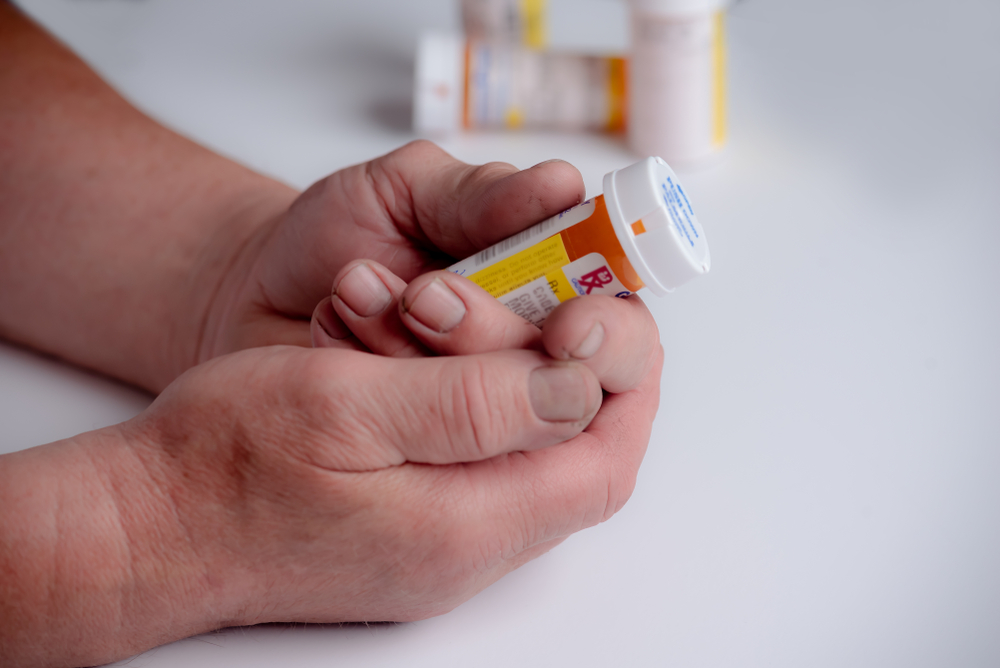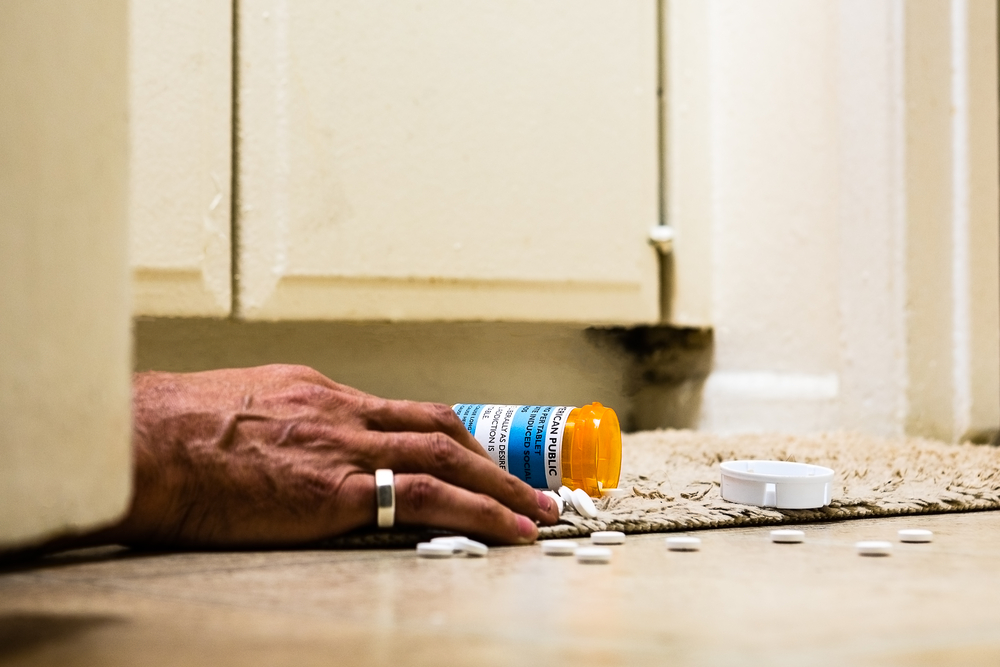Last Updated:
August 4th, 2025
Percocet Addiction | Symptoms, Effects and Causes
What is Percocet?
Percocet is a prescription medication that combines Oxycodone, a strong opioid painkiller, with paracetamol, a commonly used pain reliever. The drug is typically prescribed to manage moderate to severe pain and is usually given to patients who have been through surgery or serious injury.
The Oxycodone part of Percocet is the main painkilling element of the drug, with paracetamol acting as a pain relief booster while having the ability to reduce fevers.
Percocet is a highly effective medication, but caution must be taken when using it. Due to Oxycodone being an opioid, there is always the risk of developing a dependency. This can occur if it’s misused or taken as healthcare professionals directed. It’s for this reason that doctors usually prescribe Percocet on a short-term basis, which helps reduce the chances of complications occurring.
Is Percocet available in the UK?
While the brand name Percocet isn’t available in the UK, its components, Oxycodone and paracetamol, are. This means that taking Oxycodone and paracetamol together essentially replicates the effects of Percocet. For clarity, we’ll refer to the Oxycodone and paracetamol combination as Percocet throughout the rest of the page.
What makes Percocet addictive?
Percocet’s addictive potential comes from its oxycodone component, a powerful opioid. Oxycodone works by binding to opioid receptors in the brain, reducing pain while also triggering a surge of dopamine, the chemical linked to feelings of pleasure and reward. This dopamine release can create a sense of euphoria, making the medication appealing beyond its intended purpose.
Over time, regular use of Percocet can lead to tolerance, meaning the body requires higher doses to achieve the same pain relief or euphoric effect. This can quickly escalate into dependence, where the body relies on the drug to function normally. If stopped, withdrawal symptoms like anxiety, nausea or intense cravings may occur, further fuelling the cycle of addiction.
Struggling with an addiction? If you are ready to seek help, reach out to us today, and a member of our compassionate team will help you find the best option for starting your recovery journey.
How can a Percocet addiction form?
It can be confusing to understand how an addiction to Percocet can begin, especially if you or your loved one are taking the medication as prescribed by a doctor. After all, Percocet is meant to help with pain relief, not cause additional problems. Yet, like many opioids, its potential for addiction can sometimes catch people off guard.
Below, we take a look at some of the most common ways an addiction Percocet can form:
Prolonged use beyond the prescribed period
Even when taken as directed, long-term use of Percocet can lead to tolerance, where the same dosage no longer provides effective pain relief. For instance, someone recovering from surgery may continue taking Percocet longer than necessary, gradually increasing the dosage to achieve the same effects.
Using Percocet for emotional relief
Percocet’s ability to create feelings of relaxation and euphoria can make it tempting to use for emotional comfort. For example, a person dealing with stress or anxiety might begin taking the medication not just for pain but as a way to escape overwhelming emotions.
Misuse of someone else’s prescription
Some people may start using Percocet recreationally by accessing someone else’s prescription. For instance, a person might take a pill offered by a friend to relieve a headache or feel more relaxed, not realising how addictive it can be.
Recreational use and experimentation
The euphoric effects of Percocet can make it attractive for recreational use. For example, someone at a social gathering might experiment with the drug out of curiosity or peer pressure, unaware of the risk of developing dependence.
Escalation due to tolerance
Over time, the body adapts to Percocet, requiring higher doses to achieve the same pain relief or euphoric feeling. For example, a person prescribed Percocet for chronic pain might start taking extra pills without consulting their doctor, increasing the risk of Percocet addiction.
What are the signs of Percocet addiction?
Recognising the signs of Percocet addiction is crucial for helping yourself or a loved one seek support before the addiction worsens. Addiction to this medication can often be subtle at first, making it easy to dismiss behaviours or symptoms as part of regular use.
By understanding the behavioural, physical and psychological signs, you can identify the issue early and take action to prevent further harm.
- Doctor shopping: Visiting multiple doctors to obtain new prescriptions is a clear sign of dependency, as the person may be running out of their prescribed supply too quickly. This behaviour is observed in countries with privatised healthcare systems.
- Isolation from loved ones: Avoiding family or friends can indicate attempts to hide drug use or its effects.
- Neglecting responsibilities: Work, school or home obligations may take a backseat as the addiction takes priority.
- Increased secrecy: Hiding pills or being vague about their activities can reflect efforts to conceal their addiction.
- Drowsiness or sedation: Regular use can cause extreme fatigue, even during normal activities.
- Constricted pupils: Opioids like Percocet cause pinpoint pupils, which are often a telltale physical sign.
- Weight loss: Appetite suppression or irregular eating habits due to the drug can lead to noticeable weight changes.
- Increased anxiety or irritability: Dependency can cause heightened emotional instability, especially when access to the drug is limited.
- Obsessive focus on medication: A person may talk excessively about their next dose or show worry about running out.
- Mood swings: Fluctuating emotions, from euphoria to depression, may stem from the drug’s impact on brain chemicals.
- Cravings for Percocet: Intense urges to take the medication, even when pain is absent, are a clear sign of psychological dependence.
Spotting these signs early can make a significant difference in addressing Percocet addiction and finding the right help.
How can a Percocet addiction be treated?
Treating a Percocet addiction involves a combination of detox, therapy and ongoing support to address both the physical dependency and underlying causes of addiction. The first step is detox, where the body clears itself of the drug. This stage can be challenging due to withdrawal symptoms, which is why professional guidance is often recommended for safety and comfort.
Once detox is complete, therapy becomes a key focus. Individual counselling helps uncover the reasons behind Percocet addiction, while group therapy offers a supportive environment to share experiences and build connections. Holistic approaches, such as mindfulness, yoga or art therapy, can also play a role in promoting emotional well-being.
Aftercare is just as important as initial treatment, offering ongoing support to help prevent relapse. This could include regular therapy sessions or peer support groups to maintain a healthy and drug-free lifestyle.
What’s next?
If you or someone you care about is struggling with a Percocet addiction, taking the first step toward recovery can make all the difference. Reach out to a rehab centre today for compassionate support and guidance.
Our compassionate team are ready and available to take your call, and guide you towards lasting the lasting addiction recovery you deserve.



